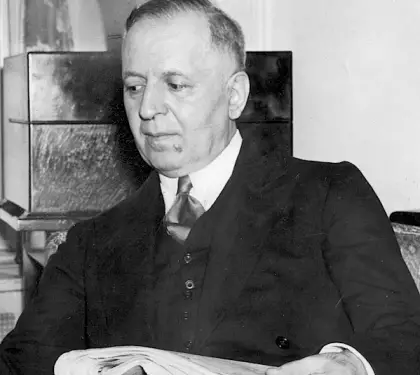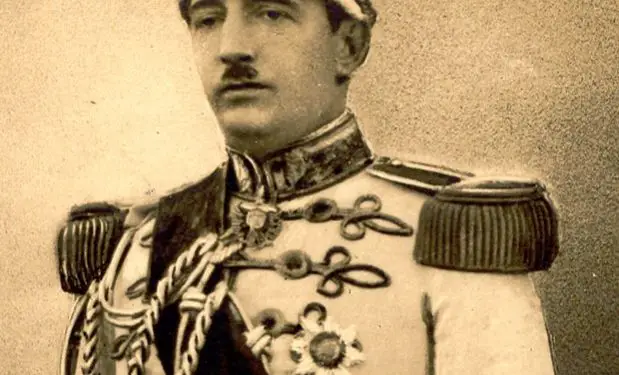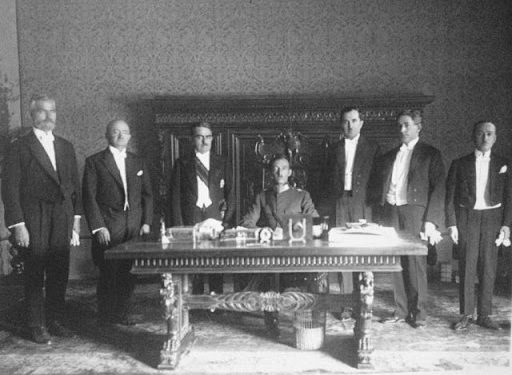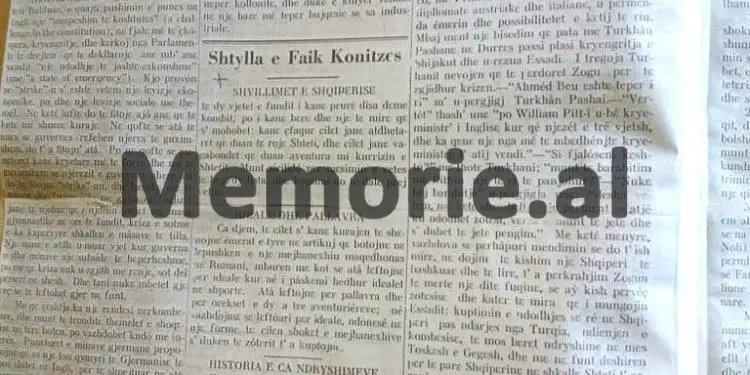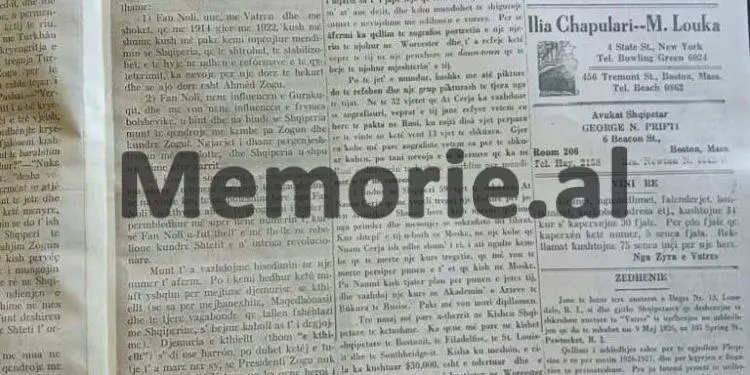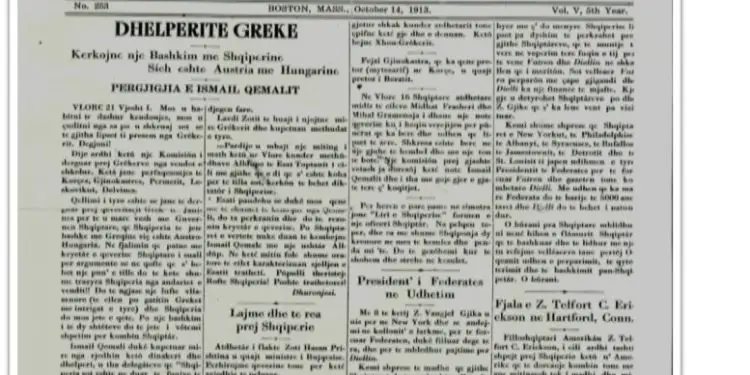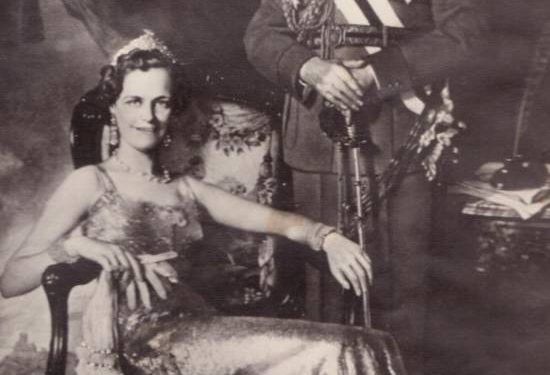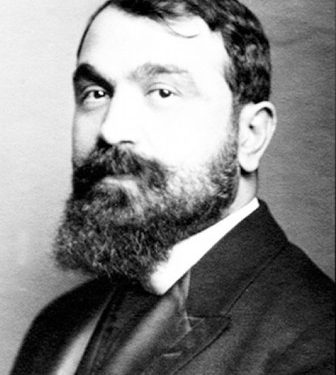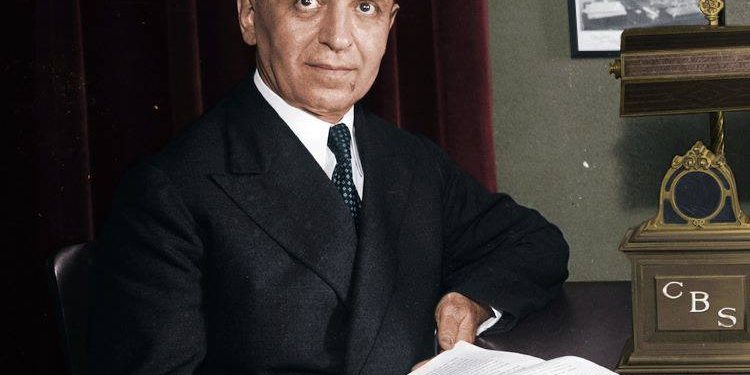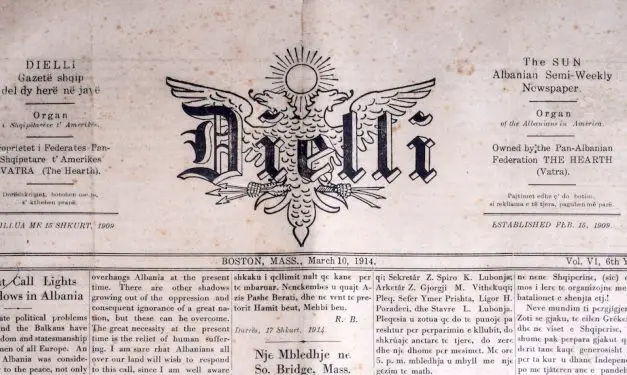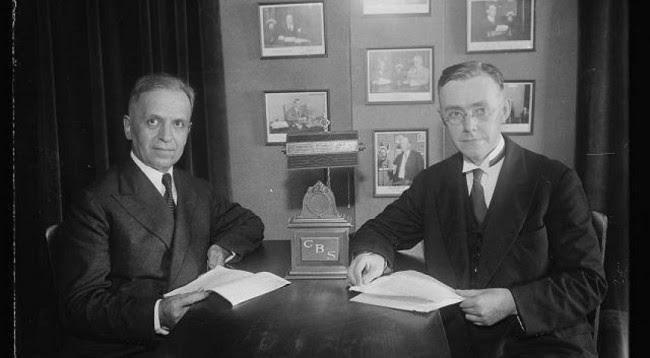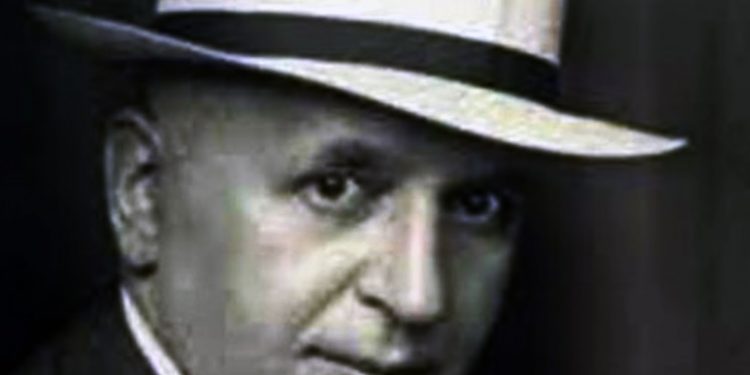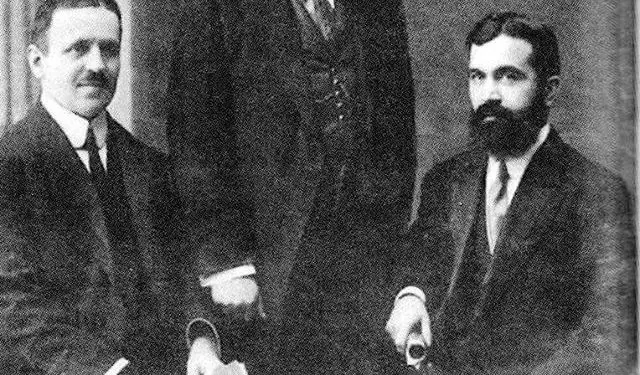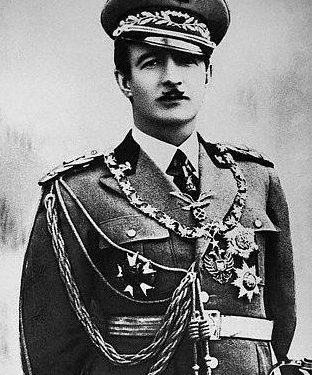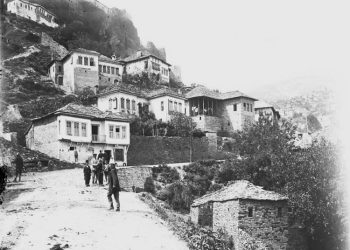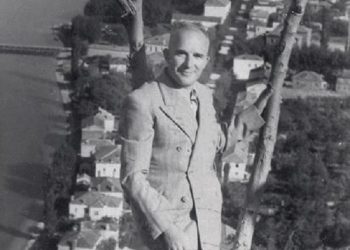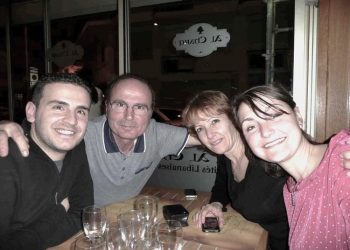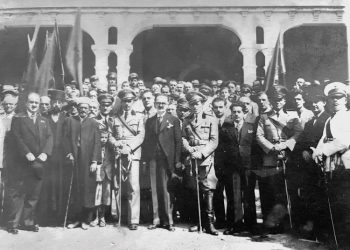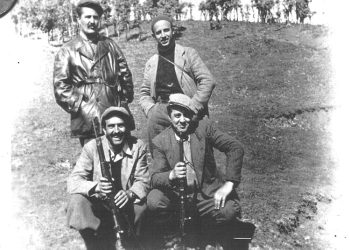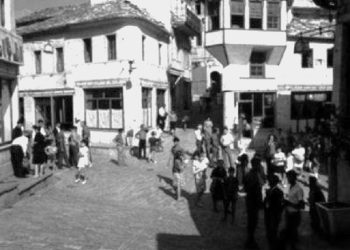Dashnor Kaloçi
Memorie.al publishes an unknown article writen by Faik Konica in the newspaper “Dielli” in Boston (dated May 6, 1926) of the Patriotic Patriotic Association “Vatra”, where in three columns, he makes an analysis giving mentioned facts and historical events that Albania had gone through from 1913 until that time (1926), in which two or three main characters of Albanian politics of that time had played and played a leading role: Ahmet Zogu, Fan Noli and Luigj Gurakuqi. Konica’s full article where he superlatively evaluates the contribution and role of Ahmet Zogu up to that time, and on the contrary, criticizes and raises a series of accusations against Fan Noli and the friend of his close collaborator, Luigj Gurakuqi, highlighting their negative sides in the power struggle.
“In 1913, I met for the first time in Tirana with Ahmed Bey Zogu (to use the titles as they were used and officially at that time). I immediately noticed the nobility united with the strength of character, manifested by the boy’s demeanor and words. I was interested. Asked. And from what I heard, I had no doubt that fate had marked him to play an important role in the new Albania. In later baking with King Carol of Romania, with Romanian Prime Minister Tito Majoresco, with Prince Wilhelm of Wied, and with Austrian and Italian diplomats, I mentioned the name and possibilities of this young man. I remember a conversation I had with Turkhan Pasha in Durrës after the Shijak uprising broke out and Essad was overthrown. “I showed Turhan the need to use Zog to resolve the crisis.” This is what Faik Konica writes, among other things, in an article he published on May 6, 1926 in the newspaper “Dielli” published by the Patriotic and Patriotic Association “Vatra”, in Boston, where in its three columns, he makes an analysis giving and mentioning historical facts and events that Albania had gone through from 1913 until that time (1926), in which two or three main figures of Albanian politics of that time, such as Ahmet Zogu, had played and played a role, Fan Noli and Luigj Gurakuqi. As we will see from Konica’s article which Memorie.al publishes for the first time, he evaluates with superlatives the contribution and role of Ahmet Zogu until that time, and on the contrary, criticizes and raises a series of accusations against Fan Noli and the friend of his close collaborator, Luigj Gurakuqi, highlighting their negative sides and egos in the power struggle. Without wanting to enter into the analysis of the reports and relations that these personalities of Albanian culture, art, politics and literature have had, since voluminous studies and publications have been made for them by professionals in the respective fields, it should be emphasized that one day after that writing, On May 7, 1926, the President of the country, Ahmet Zogu, decreed Konica as the powerful minister of Albania in the United States of America. But it should also be noted that it is hard to believe that Konica wrote that to “return the rest” to Zog, for the “reward” he received as ambassador to the United States. Likewise, Noli’s poetry where he satirizes and alludes to Konica, saying: “This Ferit changes his page / yesterday he cursed, today he praises”, which is attributed to Konica’s attitude towards the figure of Zog, does not seem to stand ?! After he (Konica) praised Ahmet Zogu early, even in the first year of his coming to power, and it seems that he was not wrong, if we consider how the events unfolded later and Zogu’s role in consolidating the state of young Albanian. Although very late, it seems that in Konica’s opinion, that a man like Ahmet Zogu was needed at the head of Albania, Noli himself agreed, if we consider the letter that he (Fan Stiljan Noli) sent in 1943 to the American Department of the State, asking them to support the return of King Zog to Albania, as he would carry out an armed movement against the Italian occupier and only King Zog would get Albania out of that situation. Without expanding further on these deductions and historical facts, Memorie.al, is publishing the full article of Konica published in the newspaper “Dielli” dated May 6, 1926, giving it together with the relevant facsimile.
Faik Konica’s article in the newspaper “Dielli” in 1926
THE DEVELOPMENTS OF ALBANIA in the last two years have done some damage to the nation, but they have also done an undeniable good: they have shown who are the patriots who want to guard the State, and who are: the vagabonds who want My Adventure the back of the State. Munt silido for teaching yourself to make two lists, and the meaning will come out of itself.
IDEALS AND FALSITIES
Some boys, who do not have the courage to write their names in the articles they publish in the footsteps of a Macedonian mejhanexhi in Romania, boast in vain that they rise to ideals when we have thrown the ideals in the basket. They lust for the nonsense and appetites of two or three adventurers; we continue to fight for ideals, albeit in a form which the companions of the mejhanex do not seem to master…
HISTORY OF CA CHANGES
When I went to Albania in 1913 to observe the affairs of kinship, I discovered with sadness that the vast majority of the people, not only did not approve of our ideals of an advanced State, but also disliked freedom. , which was being given to us by the cases and by the balance of powers of Europe. It is surprising, that it is quite true, that the vast majority of the people of Albania, with sourness, and with eyes narrowed by retorts: as it appeared a little later from the uprisings that broke out one after the other.
Given this, it was quickly realized that, in order for Albania to remain as a separate State and for the people to be hardly united and to enter the path of discipline, work and progress, the only right force was the hand of iron, yes savior of a dictator. We remembered for a while that we found the right dictator in the person of Essad Pasha Toptan. And Assad really had some skills to govern: but his old age did not promise to change his mind after the fallen changes that left everyone and left him alone.
In 1913, I met for the first time in Tirana with Ahmed Bey Zogu (to use the titles as they were used and officially at that time). I immediately noticed the nobility united with the strength of character, manifested by the boy’s demeanor and words. I was interested. Asked. And from what I heard, I had no doubt that fate had marked him to play an important role in the new Albania. In later baking with King Carol of Romania, with Romanian Prime Minister Tito Majoresco, with Prince Wilhelm of Wied, and with Austrian and Italian diplomats, I mentioned the name and possibilities of this young man. I remember a conversation I had with Turkhan Pasha in Durrës after the Shijak uprising broke out and Essad was overthrown. I told Turhan the need to use Zog to resolve the crisis.
– “Ahmed Bey is too young” Turkhan Pashai replied – “True” I said: “Yes William Pitt became Prime Minister of England when he was twenty-three years old, and has been one of the greatest prime ministers of to that country ”.-
– “How do you talk like that?” Turkhani says to me: “can we equate Pitt with an unknown young man?”
– “I do not equalize” I replied: “I just wanted, with this example to mention that where there is aptitude, value can not be and should not be an obstacle. “In this way, I continued to spread the idea that you would be good, we wanted to have a united and free Albania, to support Zog to take power one day, because there were in addition to ability and four good things that miss Assad: the meaning of the new event in Albania, after the separation from Turkey, the sense of nationality, not to make changes between Tosks and Gegs, and more importantly the desire to see Albania at the level of an organized state.
Noli fully joined me in the belief that Albania can not stand on its own two feet without a dictator, and that Zogu seems the right man for the role. Traces of these thoughts can be found in the pillars of the “Sun” during the war and then, where Zog is praised as a hero, as an idealist, as a leader who can be equated with the Anglo-Saxons, and others. Some of these praises are scored by Fan Noli himself.
This policy continued until 1921 and beyond. In 1922, Fan Noli began to associate with the Gurakuqi group, and at once his shallow mind entered in a different way. Fan Noli started to give us unpopular news about Zog: that he was formerly united with the reactionaries, that he was an enemy of an Albania as we love it, that he lost all influence, that he has no ability, that the army leans towards ” liberals ”, that we should bring the people closer to Zogu, and others. My friends from Vatra, as required by logic, as required by the discipline of our group in Albania, reflected in “Dielli” the new policy of our representative in Albania, a representative who recently was nothing but that Gurakuqi’s phonograph, until he finally toasted the square and the commissary, violating our entire program and all our ideals.
The end of what a mess and a nameless prank… What can we do? Two paths were open to us: continuing to support the masquerade until there was bloodshed and Albania was destroyed, – or returning to the first policy of Vatra, which was put before Zog, as the proper president of Albania , I took the second track.
Let us now summarize in three words what we said:
Fan Noli, I, with Vatra and my friends, from 1914 to 1922, who more or less we have held the opinion that Albania, to be laid, to be stabilized, and to enter the path of reforms and civilization, has need an iron hand and that hand is Ahmet Zogu.
Fan Noli, mother of the influence of Gurakuqi, and later mother of the influence of the Bolshevik spirit, was convinced and convinced that Albania could stand on its own two feet without Zog and against Zog. The events gave him the most complete refutation and Albania was pierced by a hair near the grave.
Most of my friends and I went back (although with slow prints, because we were sorry to break away from Fan Noli at all) we went back to the old program summarized above under number 1, and Fan Noli went deep into deeper in rebellions against the State and in revolutionary intrigues.
We can continue the conversation in a close number. Yes, we have thrown enough food here to mourn the backward boyhood (than for the mejhanejis, Macedonians and other vagabonds who secretly mock Albania, we do not cable or listen to them). Clear youth (I say “clever”) does not know or forget, but from now on must take into account, that President Zogu is not the new hero of Vatra, but has been the old hero of this organization, i disgusted, in 1922-4 by the intrigues of Gurakuqi and mother the influence of Bolshevism. And if it’s the lady to go deeper, let the sober boyhood judge who got out of the way – Fan Noli or me?/Memorie.al





